Fundraising successes at a time of catastrophe — part one
SOFII is pleased to bring you a series of examples of how fundraisers the world over are fundraising effectively in this time of crisis.
- Written by
- Ken Burnett
- Added
- October 01, 2020

With contributions from Jess Winchester, Dominique Leeming, Mark Phillips, Sean Triner, Richard Turner, Craig Linton and Joe Burnett, plus more to follow. And with huge thanks to all those great fundraisers whose successes are featured here.

This article, a collaborative effort, is also a work in progress and a call for content from SOFII readers around the world. It’s intended as an encouragement and a justification for action, something you can wave under the noses of your CEO, senior management colleagues and board members when they suggest you should be pulling back on or even out of future fundraising initiatives, or whenever you need to present your plan for a carefully constructed emergency appeal. Stories of success similar to those that follow are still in the making and will be added to SOFII as we get them, so the case for donor-focused positive fundraising will build over coming weeks. As it is, we’ve already got enough content for several long articles. But to prove our point once and for all, we want more. So please send your examples of fundraising success at a time of crisis to SOFII’s Joe, here.
This is part one - for part two, which will be released tomorrow, please click here.
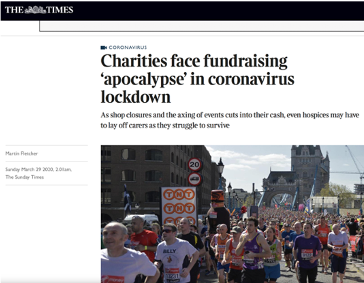
Confronted by a crisis of the scale and severity of Coronavirus Covid-19 you could be forgiven for assuming that fundraising results would fall through the floor in markets everywhere and stay there some time. Even if you know that the tradition in past times of downturn is invariably that fundraising results go up, not down and fundraisers tend to buck the trend and prosper.
Well, that’s been true in the past. But not this time, surely? Covid-19 seems so severe it will likely devastate our economies as well as the health, wellbeing and employment prospects of huge swathes of our population. Surely self-interest and personal preservation will stop most people from giving in this horrible time?
So, how do you explain Captain Tom?
Holding out for a hero: the story of Captain Tom.
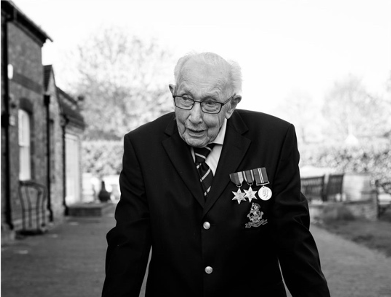
As we enter what seems like week sixty of lockdown, chances are you’ve heard about the wonderful Captain Tom Moore, a 99-year-old army veteran in the UK who decided to turn both his 100th birthday (on April 30th) and his exercise routine around his garden into an opportunity to raise money for the country’s beleaguered National Health Service. On the 6th April 2020 he launched a JustGiving page to encourage people to donate to him as he walked up and down his garden. Against all expectations, his endeavour went viral. Clearly people across the world, who were anxiously sitting in front of computers wondering how they would ever get back to normal and desperate for a hero to inspire them, suddenly had Captain Tom to believe in.
And yet it could have been so different. Captain Tom’s initial target was a modest £1,000. As the campaign snowballed, he revised it to £500,000. At the close of the crowdfund on April 30th he had raised an incredible £32,796,405 from 1,519,388 donors. That’s right: £32 million. The public was holding out for a hero and in Captain Tom, a veteran of World War II, they found him. As his birthday neared, Tom received thousands upon thousands of cards from people he’d never met but who had been touched by his generosity, determination (it can’t be easy to walk so many laps of one’s garden at age 99) and humility. Captain Tom is a reminder that in times of crisis people are looking for inspiration and reasons to believe that a return to a better life is possible, and sometimes all it takes is one amazing person to be that inspiration and provide those reasons.
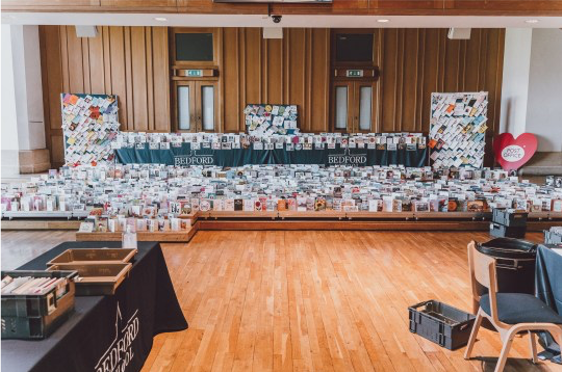
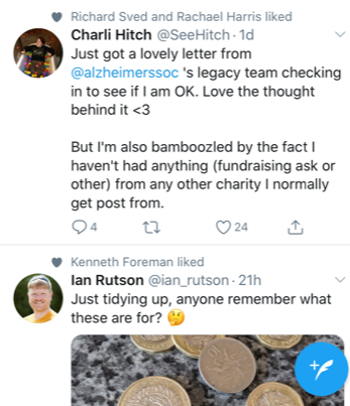
As fundraising sage Alan Clayton is always fond of saying, people give to need, of course – but they also need to give.
Yet, faced with the onslaught of this current crisis and encouraged by media horror stories, many charities’ immediate reaction was to cut communications and furlough their fundraisers. We hope that this article will make them think again. For clearly, they, their donors and their beneficiaries have missed out, because of their failure to understand how fundraising works at a time of crisis.
Captain (now Colonel) Tom is certainly not the only one reporting that he’s exceeded target at this time, though few would aspire to such extraordinary results as his. I mean, 1.5 million donors and rising… who would have believed it? Why, donor-focused fundraisers, of course!
Last week SOFII reported on Canadian fundraiser Sonya Swiridjuk’s rapidly launched and hugely successful emergency appeal for Armagh, a transitional supportive housing programme that offers secure, affordable housing to abused women for an extended period of time. The appeal – see the case history here – provided laptop computers and software for 18 women and their children who had escaped from domestic violence only to find themselves isolated in lockdown without any internet access. It’s proof that when fundraisers judge their opportunities correctly and bring their skills and compassion to bear in a timely, professional manner, great things do happen. Still, many Chief Executives, senior management teams and trustee boards just don’t get what is happening here
Ask the experts.

Leading international fundraising strategist Mark Phillips, head of London based agency Bluefrog Fundraising, is not surprised by such successes.
‘We’ve been bowled over by just how positive donors have been. The appeals that we got out quickly have broken records. Response rates have been better than we would see at Christmas, by a wide margin. Even donor recruitment is working well. Results from our press ads for UNHCR have been very good.
‘The donors we have spoken to in our research have been saying how they have been stuck at home, feeling powerless in the face of coronavirus. Fundraising is their channel of change. They are comfortable and safe. But the news brings stories every day about the people who are protecting them, who are putting themselves in harm’s way. Donors want to show appreciation and do something. That is why fundraising is so important and so powerful at the moment. This is a global emergency and donors desperately want to be part of the solution.’
Two stories of a new approach in New Zealand.
Jess Winchester leads the fundraising and membership team at New Zealand’s Royal Forest and Bird Protection Society of New Zealand Inc, known simply in Kiwiland as Forest and Bird. Her story shows donor-centred fundraising at its best.
‘New Zealand moved really fast towards the most extreme level of lockdown so we had to act swiftly to get as much fundraising lined up as possible, especially as we could see that the pandemic was going to have a significant impact on our single biggest income channel - regular giving. The programme has been running since 2010 and accounts for around 50 per cent of our income. We have 12,500 active donors, most of whom give on a monthly basis, but in the last two weeks of March it felt like the phone didn’t stop ringing as people called to tell us they had to cancel their gift because they’d lost or were at risk of losing their job, or were facing wage cuts because of the pandemic. We were facing the perfect storm: unprecedented levels of donor attrition and, with face to face activity certain to be prohibited under lockdown, no way to replace them.
‘Just the week before the world turned upside down in New Zealand we attended Ken Burnett’s workshop on the future of fundraising. Ken shared a story about how his Mum, as she became older, would have appreciated a call from a fundraiser - not to ask for a donation, but to thank her for a lifetime of giving and to help maintain a genuine connection between her and the causes she loved. He reminded us there are a lot of isolated older people who have spent their lives supporting our charities, then asked us if we didn’t think they deserved better than the way so many fundraisers end up treating them – as a lapsed donor – when their donations fall away?
‘This was the inspiration for our ‘Donor Health Check Campaign,’ backed by plentiful evidence from research by Adrian Sargeant and Jen Shang that donors who are called and thanked are more likely to give again or to increase the value of their gift. We hoped to create a feeling of loyalty and increase commitment too. The purpose of the calling campaign was to check that our regular donors were getting on okay during the isolation and restrictions imposed by the lockdown - if the donor indicated they were struggling financially we would offer to pause or decrease the level of their gift to whatever they felt comfortable with, hoping to prevent donors from feeling overwhelmed by their change of circumstances and cancelling their gift without talking to us first. The NZ Government had created brilliant information about how to get financial support, wage subsidies, employment advice and where to go for support with physical and mental health issues, so we made sure all our fundraisers had this and were well-briefed on how to respond if a donor was struggling to cope.’
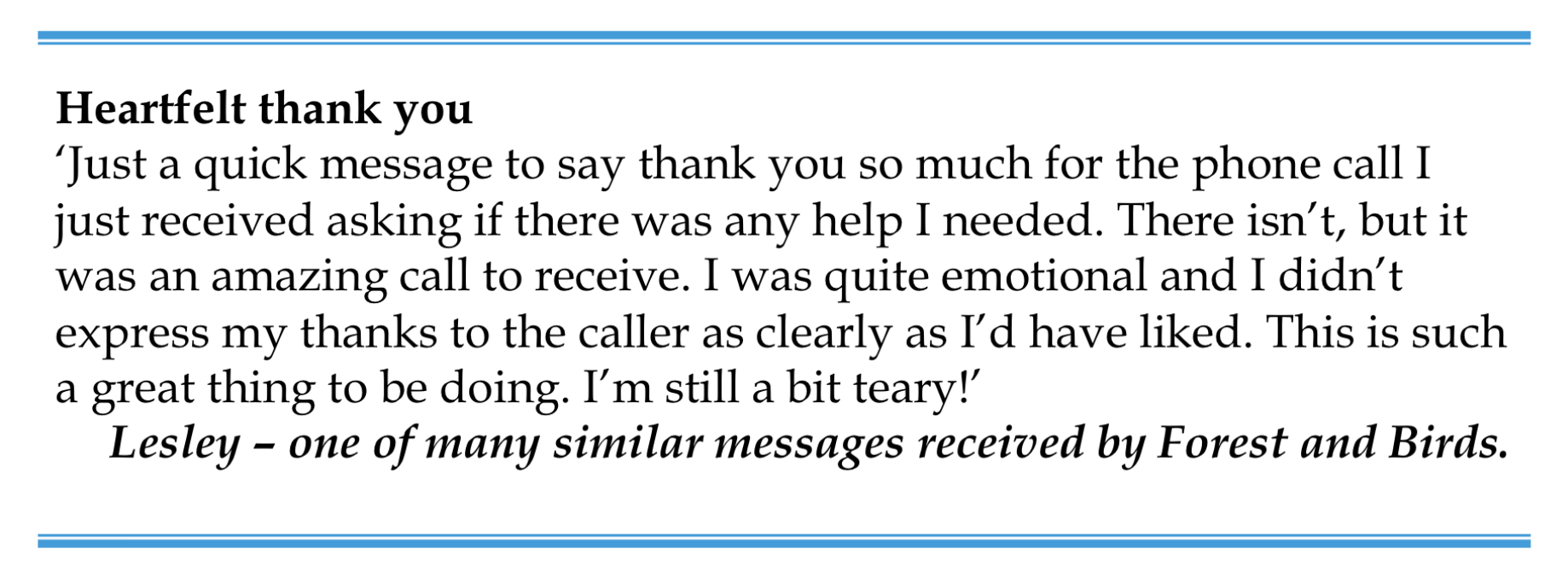
In addition to lots of emailed donor reactions we also have permission to share two of the regular giving health-check calls made by Forest and Bird and their agencies Public Outreach and Mondial. In these calls you will hear a wonderful telephone fundraiser, Nadia, speak to two donors, Jane and Karen – just click on the links below to listen.
Jess continues, sharing the results:
‘The campaign -
- 12,500 regular donors - data split between two agencies. Mondial and Public Outreach, both of whom were amazing to work with.
- We’d been doing a F2F trial with Public Outreach since the start of March - it was an added bonus that we could support their business by giving them the phone work. Now more than ever we need to be working collaboratively with our agency partners - the worst of times can give us the best opportunities to forge stronger relationships all round, and that can only be a good thing for donors and the future of the charity sector.
- We briefed the agencies that calls should be as conversational as possible, with the experience for the donor to feel like a friend had called to see how they were doing and to share some good news to cheer them up and remind them how amazing they are.
- KPIs - this was all geared to keeping donors. Based on the number of cancels we had received in March and the start of April, we’d thought we’d be lucky to keep the number of cancels below 30 per cent - colleagues and peers at other charities shared their concerns that the campaign would actually encourage donors to cancel their gift.
- Average call lengths - from 5-15 minutes. The calls were longer at the start of the campaign as our fundraisers found their feet and became comfortable with the freedom to just have a nice conversation. Now they are more like 6-7 minutes.
- Because we hadn’t done a relationship campaign of this size before, we specified we wanted fundraisers who had experience of bequest campaigns because these tend to be more conversational.
Feedback from donors -
- Positive feedback outweighed any negative responses - we had emails from donors to say thank you for calling them and that they appreciated it. We also listened to call recordings on a regular basis and made sure we were taking note of any comments.
- Of course we had a couple of almost-complaints - one donor queried whether this was a good use of time and money and a Board member who received a call said she couldn’t really understand the point of it. We also had a handful of donors who called or emailed us to say they were concerned about the legitimacy of the call and were worried it was a scam. With each of these we took the time to call them back and also follow up in writing to make sure they had received a call as part of the campaign and were reassured that donor care was our top priority.
- Listening to the call recordings are the highlight of my week - not just hearing how much this campaign means to donors but also to the fundraisers who are making the calls.’
Results so far (calling won’t be completed until mid-May):
- Public Outreach graded each call positive / neutral / downgrade / cancel / pause - over 78 per cent of their responses have been positive.
- Across both agencies we are seeing less than two per cent of donors have cancelled during the call – so, a far cry from the 30 per cent we had feared.
- We will need to look at donor behaviour over the coming months and years to see what the true impact of this campaign will be.
Learning points:
- Donor feedback and call recordings show this was the right thing to do - back yourself, if your gut instinct tells you that something is important to your donors, make sure it happens.
- Choice of fundraiser is really crucial - they need to be comfortable with having an off-script genuine conversation and for some who are really used to more transactional / admin type calls this type of campaign just doesn’t work (when we listened to the calls where there was a complaint it was nearly always evident that this was the case). We struck gold with a couple of fundraisers but I’d recommend asking your agency if you can have an actual conversation with the people who are going to be on your campaign so you can experience what your donor will hear.
- Make sure absolutely everyone in your organisation knows this is happening - we thought we had informed everyone who was likely to have contact with donors but we were wrong and this didn’t help reassure donors who contacted us to query the legitimacy of the calls.
Respond personally to every query or complaint - we had some great conversations as a result of this too and it was a reminder that only people who really care about your charity and its reputation take the trouble to get in touch.’
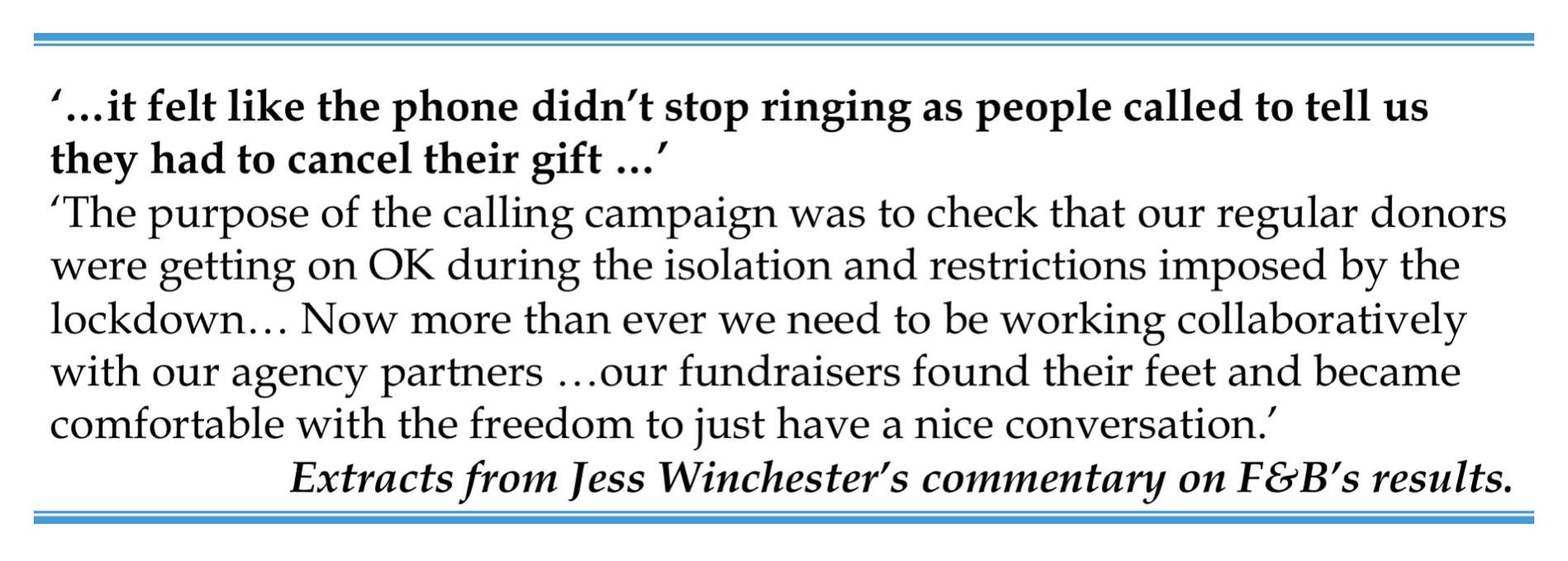
Our second story from New Zealand features SPCA – the Society for the Prevention of Cruelty to Animals. SPCA and its communities have been protecting New Zealand’s animals for over 140 years – animals who are sick, injured, neglected, abused or simply abandoned. Dominique Leeming and her colleagues at SPCA have been developing a donor-centred fundraising approach over many years now and see clearly from the current crisis that this has been a wise approach indeed. Here Dominique describes how it happened:
‘SPCA’s supporters and donors have been absolutely amazing through the COVID-19 crisis! In the first week that New Zealand went into lockdown we sent a couple of emails letting our donors know what our organisation is doing and acknowledging the challenges many of them are now facing. Our major donor and legacy team have been phoning as many donors as they can, doing a wellbeing check and as many others as possible are directly engaging with donors. We also launched an emergency appeal on the 30th March using both digital and mail channels having no idea how the appeal would be received. We didn’t include a reply device or envelope with the mail appeal (we didn’t want vulnerable older donors leaving home to post a donation), but rather asked them to give online or via bank transfer if they were able, and have phone as an alternative. It makes me tearful to write this but the phones have been ringing off the hook and the donations are flooding in. Just after the appeal launch I received this email from Vanessa, our data and insights manager: ‘So, after a bananas day yesterday, I arrived this morning to see we had received another 500 donations online overnight.’ This appeal has become the most successful appeal in SPCA’s history, by a vast amount, people are continuing to respond with generosity and kindness. They desperately want to help the animals. Just yesterday one of our very special donors who had already gifted $25,000 phoned in with another gift of $10,000. The messages of support that are coming in with gifts of all sizes are so heart-warming.’
Some SPCA donor comments
‘Thank you for your email with such good news that you rehomed so many animals. I have been very concerned about the SPCA in these uncertain times and am so pleased that you are considered an essential service to enable you to continue with the wonderful work you do for our precious animals. Thank you to all. Margaret.’
‘So glad for those animals who were re-homed and they will all bring interest and love to their new families at a perfect time for settling in. Thanks so much for continuing to care for the ones still waiting.’
‘I don’t normal reply to COVID update emails but I thought yours was particularly well written and I enjoyed the update. Take care of yourselves and thanks for the great work that you all do, Nikki’
‘Kia ora Andrea, many thanks for this positive story- much needed right now! Noho ora mai’
‘I support 10 other charities and SPCA stands out with your exceptional communication.’
‘Hopefully I can give more next week, please take good care of those lovely animals x
‘Donating what I would have spent buying my lunch this week…’
‘It is terrifying times for all and I want to help as much as I can. Thank you for being there for all animals in your care.’
‘I wish I could give more, but I hope everyone gives just a little, that would still help, right?’
‘You guys are amazing! Love donating to the SPCA when I can afford to XX’
‘Thank you for all the amazing work that you do. Knowing you are out there doing what you do, helps an animal lover like me sleep better at night!’
Few things can be more thrilling than fundraising when you get it right. It seems from these two snapshots that great fundraising is going on in New Zealand.

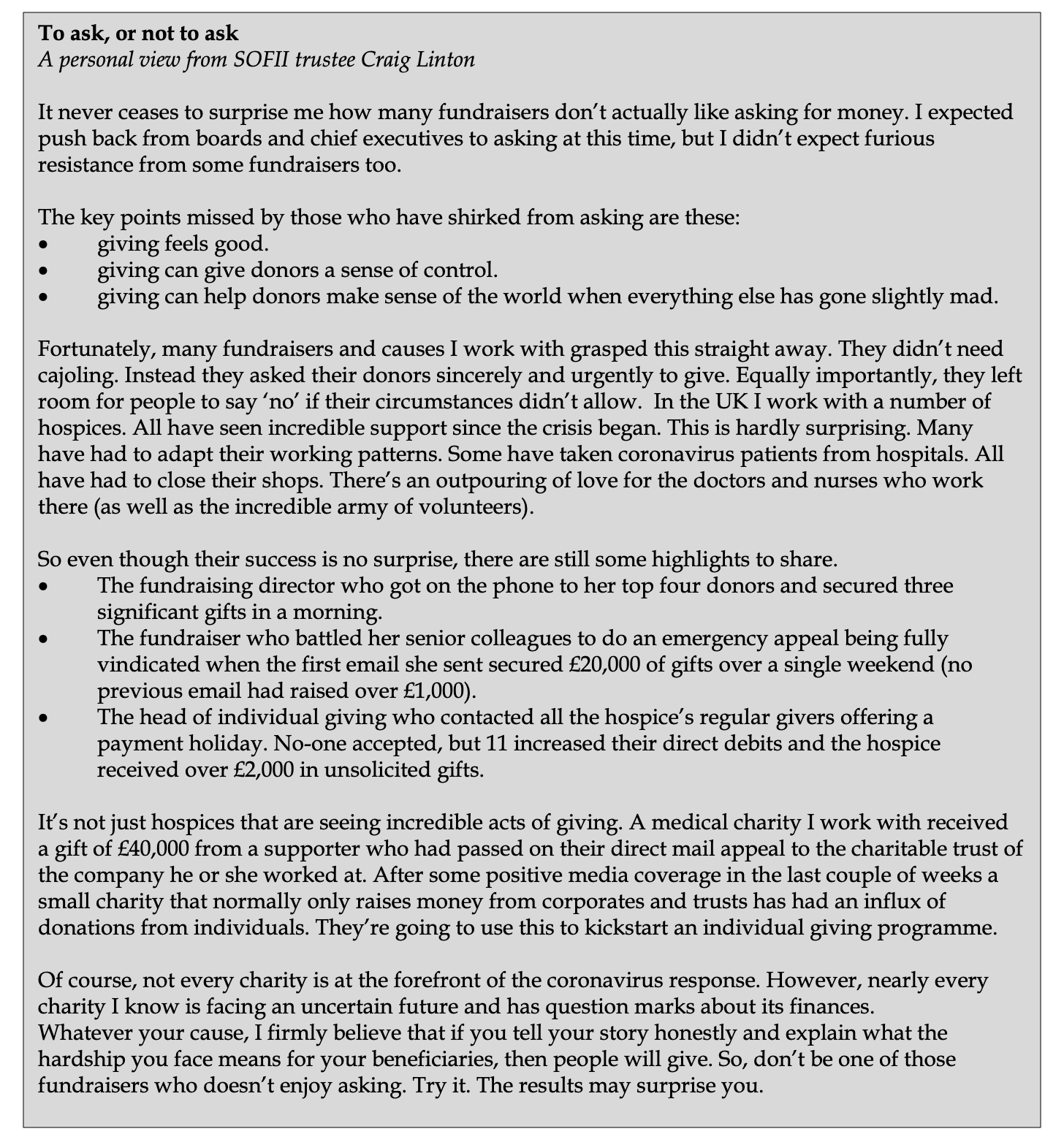

As you can see, the various responses to this unprecedented pandemic have been disparate and inspiring, from lone individuals doing the incredible to organisations finding new ways to reach out to donors. Click here for part two of this article, when we will bring you further amazing examples of people rising up to face to coronavirus outbreak from around the world.
Please click here to read our full coverage of how individuals and charities are facing up to the coronavirus crisis. And as mentioned earlier, please e-mail joe@sofii.org if you want to share your own experiences of responding to this unique situation.




















